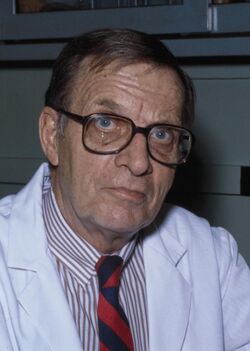Biography:Lewis Thomas
Lewis Thomas | |
|---|---|
 | |
| Born | November 25, 1913 Flushing, New York, US |
| Died | December 3, 1993 (aged 80) Manhattan, New York, US |
| Alma mater | Princeton University, Harvard Medical School |
| Awards | National Book Award (3) |
| Scientific career | |
| Fields | Biology, science writer, academic administration |
| Institutions | Tulane University School of Medicine |
Lewis Thomas (November 25, 1913 – December 3, 1993) was an American physician, poet, etymologist, essayist, administrator, educator, policy advisor, and researcher.
Life and career
Thomas was born in Flushing, New York and attended Princeton University and Harvard Medical School. He became Dean of Yale Medical School and New York University School of Medicine, and President of Memorial Sloan-Kettering Institute. His formative years as an independent medical researcher were at Tulane University School of Medicine.
He was invited to write regular essays in the New England Journal of Medicine. One collection of those essays, The Lives of a Cell: Notes of a Biology Watcher (1974), won annual National Book Awards in two categories, Arts and Letters and The Sciences (both awards were split).[1] (He also won a Christopher Award for that book.) Two other collections of essays (originally published in NEJM and elsewhere) were The Medusa and the Snail and Late Night Thoughts on Listening to Mahler's Ninth Symphony. In its first paperback edition, The Medusa and the Snail won another National Book Award in Science.[2][lower-alpha 1]
His autobiography, The Youngest Science: Notes of a Medicine Watcher, is a record of a century of medicine and the changes which occurred in it. He also published a book on etymology titled Et Cetera, Et Cetera, poems, and numerous scientific papers.
Many of his essays discuss relationships among ideas or concepts using etymology as a starting point. Others concern the cultural implications of scientific discoveries and the growing awareness of ecology. In his essay on Mahler's Ninth Symphony, Thomas addresses the anxieties produced by the development of nuclear weapons.[3] Thomas is often quoted, given his notably eclectic interests and superlative prose style.
Thomas was a member of the American Academy of Arts and Sciences (1961),[4] the United States National Academy of Sciences (1972),[5] and the American Philosophical Society (1976).[6] The Lewis Thomas Prize is awarded annually by The Rockefeller University to a scientist for artistic achievement. He died in 1993 of Waldenstrom's disease, a rare lymphoma-like cancer.
His daughter is writer Abigail Thomas.[7]
Books
- The Lives of a Cell: Notes of a Biology Watcher, 1974, Viking Press: ISBN 0-670-43442-6, Penguin Books, 1995 reprint: ISBN 0-14-004743-3
- A Long Line of Cells. Collected Essays, 1990, Viking Penguin. ASIN B000UWN4OM
- The Medusa and the Snail: More Notes of a Biology Watcher, 1979, Viking Press: ISBN 0-670-46568-2, Penguin Books, 1995 reprint: ISBN 0-14-024319-4
- Late Night Thoughts on Listening to Mahler's Ninth Symphony, 1983, Viking Press: ISBN 0-670-70390-7, Penguin Books, 1995 reprint: ISBN 0-14-024328-3
- The Youngest Science: Notes of a Medicine-Watcher, 1983, Viking: ISBN 0-670-79533-X, Penguin Books, 1995 reprint: ISBN 0-14-024327-5
- Et Cetera, Et Cetera: Notes of a Word-Watcher, 1990. Little Brown & Co ISBN 0-316-84099-8, Welcome Rain, 2000 ISBN 1-56649-166-5
- The Fragile Species, 1992, Scribner, ISBN 0-684-19420-1, Simon & Schuster, 1996 paperback: ISBN 0-684-84302-1
Notes
- ↑ This was the 1981 award for paperback Science.
From 1980 to 1983 in National Book Awards history there were dual hardcover and paperback awards in most categories, and multiple nonfiction subcategories. Most of the paperback award-winners were reprints, including this one.
References
- ↑
"National Book Awards – 1975" . National Book Foundation. Retrieved 2012-03-05.
(With acceptance speech by Thomas.) - ↑ "National Book Awards – 1981". National Book Foundation. Retrieved 2012-03-05.
- ↑ Lewis Thomas: Late Night Thoughts on Listening to Mahler's Ninth Symphony
- ↑ "Lewis Thomas" (in en). https://www.amacad.org/person/lewis-thomas-0.
- ↑ "Lewis Thomas". http://www.nasonline.org/member-directory/deceased-members/49784.html.
- ↑ "APS Member History". https://search.amphilsoc.org/memhist/search?creator=Lewis+Thomas&title=&subject=&subdiv=&mem=&year=&year-max=&dead=&keyword=&smode=advanced.
- ↑ Berger, Marilyn (December 4, 1993). "Lewis Thomas, Whose Essays Clarified the Mysteries of Biology, Is Dead at 80". New York Times. https://www.nytimes.com/1993/12/04/obituaries/lewis-thomas-whose-essays-clarified-the-mysteries-of-biology-is-dead-at-80.html.
External links
- Woodlief, Ann (2003). "Lewis Thomas (1913-1993)". Lewis Thomas (1913-1993). 275: Twentieth-Century American Nature Writers: Prose. https://archive.vcu.edu/english/engweb/LewisThomas.htm. Retrieved 19 October 2021. Succinct review of Thomas' life and of the books listed above.
- Gerald Weissmann, "Lewis Thomas", Biographical Memoirs of the National Academy of Sciences (2004)
- A film clip "The Open Mind - Genetic Manipulation (1983) is available at the Internet Archive
- A film clip "The Open Mind - "The Youngest Scientist: Notes of a Medicine Watcher" (1983)" is available at the Internet Archive
 |
